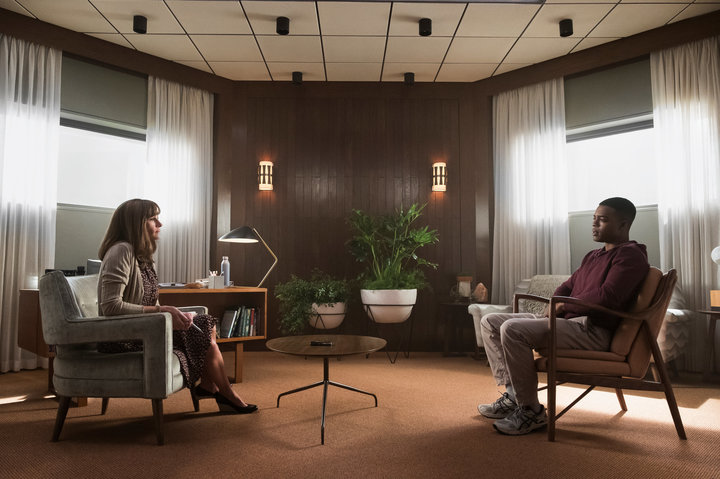[ad_1]
Historically, a Julia Roberts character is rarely allowed contradictions. She can be brassy or naive but never unknowable. Roberts, arguably the defining movie star of the past 30 years, has had precious few opportunities to disappear into someone we might call an enigma. You don’t have to figure out a Julia Roberts character because the script has always done it for you.
And then along came “Homecoming.”
Easily the best thing Roberts has touched since “Erin Brockovich” 18 years ago, the first season of Amazon Prime’s silvery psychothriller revamps the actress’ armory within its first five minutes.
Roberts plays Heidi Bergman, a social worker employed at a Florida facility that houses freshly discharged members of the military easing into civilian life with professional aid. In the inaugural scene, Heidi greets her newest client (rising star Stephan James, soon to appear in “If Beale Street Could Talk”), flashing a Roberts-certified grin during their warm introduction. She moves through her beige, fish-tanked office with tranquility and an optimism about the progress that awaits them. So far, so Julia.
The scene is brief, terminating the session before it has even begun. A Disney-ready symphonic score swells, the camera panning out the window behind Heidi’s desk. And then, with a thunderclap, everything shifts. The frame’s dimensions shrink, blackening the edges so the action occupies only half the screen, as if to announce something is awry. But what? There, again, is Heidi, in a condensed aspect ratio, looking slightly older and waiting tables at an even beiger seafood restaurant on a pier. Four years have lapsed. She’s the same person we just saw smiling at her admirable office job ― and yet she’s not.
She’s Julia Roberts ― and yet, magnificently, she is very much not.

Amazon Studios
Across 10 snug and addictive half-hour episodes, Roberts sinks further into her not-Julia-Roberts-ness. For someone whose fame and charm has long preceded the characters she portrays, “Homecoming” is a revelation. In widescreen, she is cautious but bright-eyed; scrunched to half that scope, she is weathered and confined. Something or someone has robbed her spirit.
Part of the ingenuity stems from the show’s time-hopping structure: When the screen narrows, we are thrust into a future in which Heidi cannot recall key events from her tenure at the titular rehabilitation program. That design lets Roberts crisscross two divergent mindsets in each episode, and it lets us play detective alongside her. When a Department of Defense investigator (Shea Whigham) starts probing Heidi about her past, it falls on her shoulders ― and ours ― to figure out what really happened to the veterans she thought she was helping. Instead of steering the story, as Roberts does even when she gets second billing on a project, she is the audience’s proxy, equally bewildered by the shadowy turns of events.
The less you know before watching “Homecoming,” the better. Adapted from Eli Horowitz and Micah Bloomberg’s fiction podcast of the same name, the series is directed by “Mr. Robot” maestro Sam Esmail, who streamlines his hyperstylish kinetics into something crisper and more decisive. He took a swing in casting Roberts not because she doesn’t seem capable but because Heidi is by definition a role that would go to Laura Dern or Regina King ― someone celebrated for the exact complexities that “Homecoming” requires.
Roberts’ performance works in spades because the show, similarly, won’t settle for being just one thing. It’s far too Hitchcockian for that, the sort of conspiracy caper that Robert Redford would have made in the ’70s. Without needing a single combat sequence, it’s a political cryptogram about PTSD and wartime horrors. But it’s also a chilling portrait of corporate American greed, as the company running the Homecoming initiative ― led by a desperate bully (Bobby Cannavale) who barks orders at Heidi from his Bluetooth headset ― is best known for manufacturing household products, not refurbishing soldiers. And most significantly, it’s a character study about a woman who has been used and manipulated and the ways she processes the accompanying memories so they redefine her reality.

Amazon Studios
In September, when I talked to Roberts at the Toronto International Film Festival, where the first four episodes of “Homecoming” premiered, she insisted she doesn’t see this as a new chapter in her career. Nor is it a comeback — as many will claim — considering that “Wonder,” “Money Monster,” “Mother’s Day,” “The Normal Heart” and “Secret in Their Eyes” came out in the past four years.
“I asked for an ‘introducing’ credit on this, and Sam wouldn’t give it to me,” she joked.
But next month Roberts will headline the mother-son addiction drama “Ben Is Back” alongside Lucas Hedges, and neither it nor “Homecoming” feels like an obvious choice for the Oscar winner, who has been treated by Hollywood as more a brand than a talent. She has inched in this new direction before, but it has never quite clicked as it does here, largely because she’s never been gifted with material as rich as “Homecoming.” As for what it all means, 31 years into her career, she plays coy. “I don’t know. This is for other people to puzzle out,” she said. “I just put on the cute outfits and show up.”
Whether or not she’s introspective about what these new projects will do for her reputation, Roberts is having a deserved moment ― the kind she hasn’t experienced since at least the early 2010s, when her renown helped her rise above disappointing adaptations of “Eat Pray Love” and “August: Osage County.” The second half of “Homecoming,” which begs to be binged in one sitting (look out for a critical post-credit scene in the finale), reveals what an expressive actress Roberts is when playing forlorn. The mystery’s threads intertwine, and suddenly Heidi must reckon with her actions, as well as those of her overlords, all while a bureaucrat (and her mother, aka Sissy Spacek) demands answers. It evokes “Erin Brockovich” and “The Pelican Brief” but with a far more restrained palette.
Often shot in closeup and prioritized over the underdeveloped supporting cast, Roberts reduces her typical twinkle to a glimmer. Heidi’s smile is a performance, masking a riddle that turns terrifying. Meticulously plotted without becoming overcomplicated or exceedingly cerebral, “Homecoming” lets Roberts be someone she isn’t, at last.
[ad_2]
Source link

